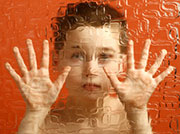
WEDNESDAY, July 22, 2015 (HealthDay News) — Low levels of a certain hormone may play a role in the social difficulties that children with autism spectrum disorders experience, new research suggests.
Vasopressin, a hormone that helps regulate blood pressure, may play a role in social behavior, according to Karen Parker, a co-author of the study and an associate professor of psychiatry and behavioral sciences at Stanford University School of Medicine.
“Vasopressin may be a biological marker of, and potential drug target for, social impairments in autism,” Parker said. “There are currently no medications that effectively treat the social deficits in people with autism.”
Autism spectrum disorders affect an estimated 1 in 68 children, according to the U.S. Centers for Disease Control and Prevention. Among the social skills sometimes lacking in children with autism is one called “theory of mind.” This refers to the realization that other people have different perspectives, feelings and experiences, according to the advocacy organization Autism Speaks.
Parker’s team found that children with autism who struggled more with theory of mind tasks also had lower vasopressin levels.
However, the study only found an association between lower levels of vasopressin and theory of mind tasks in children with autism. It did not prove a cause-and-effect relationship between vasopressin and social difficulties.
The findings were published July 22 in the journal PLOS ONE.
The study first compared vasopressin levels in the blood to those in the cerebrospinal fluid of 28 children and adults. They did this to be sure the levels were similar so that they could use blood levels of vasopressin as a “surrogate” for levels in the brain, Parker explained.
Then the researchers compared the vasopressin levels in the blood in three groups. One group included 57 children with autism. The second group had 47 typically developing children who had siblings with autism. The third group included 55 typically developing children who didn’t have any siblings with autism.
The children were from ages 3 to 12. They underwent testing for their cognitive skills, their social responsiveness, their ability to recognize others’ emotions and theory of mind.
The levels of vasopressin varied from low to high across all three groups. The only time the levels seemed to matter were on theory of mind scores among children with autism. In kids without autism, vasopressin levels didn’t seem to affect their performance on theory of mind tests.
Dr. Glen Elliott, chief psychiatrist and medical director of Children’s Health Council in Palo Alto, Calif., said this research is very preliminary.
“This really is a study that prepares the way for further research, first by showing that a blood measure gives a reasonable, though far from perfect, estimate of what is going on in the brain,” he said. “Second, it demonstrates a statistically significant correlation between blood concentrations of vasopressin and one aspect of social interaction, theory of mind.”
Though he found the results intriguing, Elliott pointed out that the vasopressin levels were linked only with a single facet of social functioning, not simply the existence of autism. “It is essential to keep in mind that the data are preliminary and a long way from offering a treatment even for one symptom of autism, let alone the disorder itself,” he said.
The next step is to look at whether giving vasopressin to children with autism with low levels of the hormone makes a difference in their social skills or theory of mind tests, Parker said. She and her colleagues are working on a study like that now.
“Animal studies have shown that variation in vasopressin biology is associated with variation in social abilities,” Parker said. “Moreover, when scientists experimentally diminish vasopressin levels in the brain, animals show social impairments.”
Yet in humans, the study revealed no effect from lower vasopressin levels in children who did not have autism.
“We may not have seen this association in typically developing kids because individual differences in blood vasopressin levels may only begin to negatively impact social abilities at the low end of the functional range,” Parker said. “That may be why this relationship is only evident in people with autism.”
Much more research needs to occur, however, before researchers learn whether adjusting vasopressin levels makes any difference for children with autism, suggested Dr. Andrew Adesman, chief of developmental and behavioral pediatrics at Cohen Children’s Medical Center of New York in New Hyde Park.
“Though these findings are interesting and may prove helpful to researchers going forward, they do not provide parents of children with autism spectrum disorders any immediate clinical benefit from either a diagnostic or a therapeutic standpoint,” Adesman said.
More information
For more about autism, visit the U.S. Centers for Disease Control and Prevention.
Copyright © 2026 HealthDay. All rights reserved.

